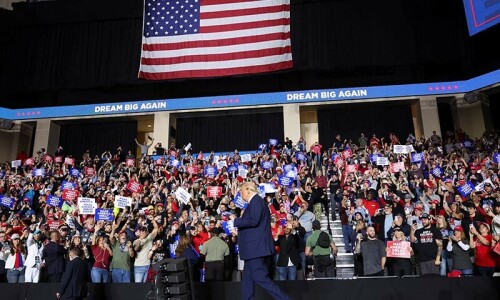US: election that could disrupt global money and trade flows, investors are selling the yen and taking cover in cash, India, pockets of China’s markets, and Singapore dollars.
Since the region is a major exporter and shares and currencies are sensitive to changes in US trade policies, Asia’s financial markets are at the forefront of what could be a wild ride when votes are counted and in the months to come.
As a result, money managers are avoiding direct wagers on the outcome and instead focusing on reducing exposure to vulnerabilities in Hong Kong stocks and Japanese manufacturers and placing bets in India or China that stand to gain regardless of the US president.
As a result of the market’s abundance of domestic drivers and lower correlation with global asset movements, Pictet Asset Management’s Asia special situations hedge fund manager Jon Withaar stated, “We actually view China as a decent place to hide.”
He stated, “The best thing for us to do is just sit on the sidelines and wait,” after reducing bets in Hong Kong, where foreign selling of Chinese assets is likely to focus, and Japan, where tariffs pose a risk for automakers.
Financial markets have moved to sell US bonds and buy dollars in anticipation that a Trump administration would increase inflation in the final stretch leading up to the election on November 5. Betting odds have Republican Donald Trump leading Democrat Kamala Harris.
When selling against the dollar in Asia, the low-yielding yen is preferred. Nick Ferres, chief investment officer of Vantage Point Asset Management, owns Japanese stocks and holds a short yen position, but he is not directly trading the election.
He stated, “Our sense is that the Donald will win, and it might even be a Republican sweep.”
“The implication for the dollar is that Trump is probably a little bit more pro-growth…the consequence is probably a higher path of rates and even more of the rate cuts that are still there for the Fed might be priced out,” according to the article. Through October, the yen lost the most against the dollar by any G10 currency, dropping 6.5%.
Close call Investors claim that they are also looking for markets that are least susceptible to tariff risks or where other significant tailwinds, such as demographics and China’s anticipated stimulus plans, appear to be blowing.
On October 29, 2024, a rally is held in Washington, D.C., on the day that Democratic presidential nominee and US Vice President Kamala Harris gives a speech on the National Mall. — Reuters According to Ray Sharma-Ong, head of multi-asset investment solutions for Southeast Asia at abrdn, the Singapore dollar would outperform regional currencies because the city-state controls the currency. However, Indian stocks may be protected.
According to him, “India benefits from strong domestic economic growth, low exposure to potential trade conflict due to low export-to-GDP ratio exposure, and a tilt toward services exports, supported by strong earnings that are not reliant on technology.”
“We also expect the equity market to favor defensive sectors like utilities and staples that are less susceptible to exports and potential tariffs.” The range of outcomes, including a drawn-out or contested vote count, and the polls that show the race to be too close to call mean that policy implications may not be immediately apparent.
John Hempton, the Sydney-based founder and chief investment officer of the hedge fund Bronte Capital, stated, “I honestly don’t know what Trump can achieve.”
“If I really don’t know what I’m doing, I just try to stay out of the way and try to do as little damage as possible.”
Despite this, Goldman Sachs points out that emerging market funds have been increasing their exposure to China and North Asia over the past month. This trend is expected to accelerate once the election is over and investors no longer feel as much uncertainty.
Allspring Global Investments portfolio manager Gary Tan stated, “We see emerging markets equities to be well placed to outperform next year regardless of the outcome” in light of China’s improved economy and the United States’ reduction in interest rates.



